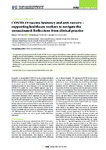COVID-19 vaccine hesitancy and anti-vaxxers – supporting healthcare workers to navigate the unvaccinated: Reflections from clinical practice
| dc.contributor.author | Hoare, Jacqueline | |
| dc.contributor.author | Mendelson, M | |
| dc.contributor.author | Frenkel, L | |
| dc.date.accessioned | 2022-03-07T11:02:26Z | |
| dc.date.available | 2022-03-07T11:02:26Z | |
| dc.date.issued | 2022-02-02 | |
| dc.identifier.issn | 0256-9574 | |
| dc.identifier.issn | 2078-5135 | |
| dc.identifier.uri | http://hdl.handle.net/10026.1/18895 | |
| dc.description.abstract |
<jats:p>An important step in preparation for the fourth COVID-19 wave is to provide healthcare workers (HCWs) with skills to facilitate behaviour change in vaccine-hesitant patients. Convincing members of the public who are vaccine hesitant rather than anti-vaxxers should be the focus of our efforts. Our experience is that vaccine-hesitant individuals and anti-vaxxers are generally distinct cohorts, with differing reasons for their vaccine reluctance. If we are to truly address hesitancy, we must take time to understand the reasons for an individual’s hesitancy. Developing a conceptual framework and skills for HCWs during encounters with unvaccinated individuals will be important not only for shifting some to get vaccinated, but also to manage the complex emotions that HCWs will undoubtedly be forced to confront during the fourth wave.</jats:p> | |
| dc.format.extent | 11-13 | |
| dc.language.iso | en | |
| dc.publisher | Health and Medical Publishing Group (HMPG) | |
| dc.subject | Immunization | |
| dc.subject | Prevention | |
| dc.subject | Vaccine Related | |
| dc.subject | Clinical Research | |
| dc.subject | Biotechnology | |
| dc.title | COVID-19 vaccine hesitancy and anti-vaxxers – supporting healthcare workers to navigate the unvaccinated: Reflections from clinical practice | |
| dc.type | journal-article | |
| dc.type | Journal Article | |
| plymouth.author-url | https://www.webofscience.com/api/gateway?GWVersion=2&SrcApp=PARTNER_APP&SrcAuth=LinksAMR&KeyUT=WOS:000744180800018&DestLinkType=FullRecord&DestApp=ALL_WOS&UsrCustomerID=11bb513d99f797142bcfeffcc58ea008 | |
| plymouth.issue | 1 | |
| plymouth.volume | 112 | |
| plymouth.publication-status | Published | |
| plymouth.journal | SAMJ South African Medical Journal | |
| dc.identifier.doi | 10.7196/samj.2022.v112i1.16208 | |
| plymouth.organisational-group | /Plymouth | |
| plymouth.organisational-group | /Plymouth/Faculty of Health | |
| plymouth.organisational-group | /Plymouth/Faculty of Health/Peninsula Medical School | |
| plymouth.organisational-group | /Plymouth/REF 2021 Researchers by UoA | |
| plymouth.organisational-group | /Plymouth/REF 2021 Researchers by UoA/UoA01 Clinical Medicine | |
| plymouth.organisational-group | /Plymouth/Users by role | |
| plymouth.organisational-group | /Plymouth/Users by role/Academics | |
| dcterms.dateAccepted | 2021-10-18 | |
| dc.rights.embargodate | 2022-3-8 | |
| dc.identifier.eissn | 2078-5135 | |
| dc.rights.embargoperiod | Not known | |
| rioxxterms.versionofrecord | 10.7196/samj.2022.v112i1.16208 | |
| rioxxterms.licenseref.uri | http://www.rioxx.net/licenses/all-rights-reserved | |
| rioxxterms.licenseref.startdate | 2022-02-02 | |
| rioxxterms.type | Journal Article/Review |


